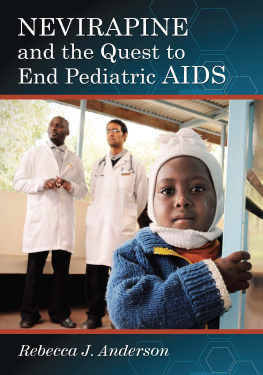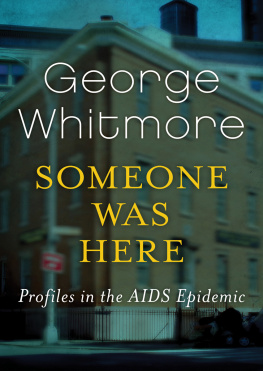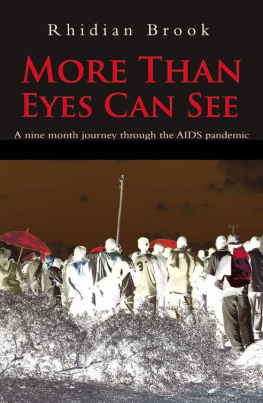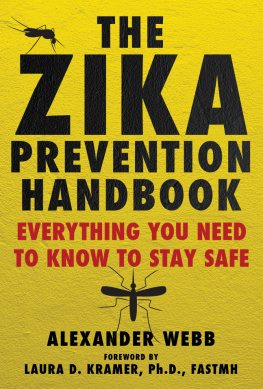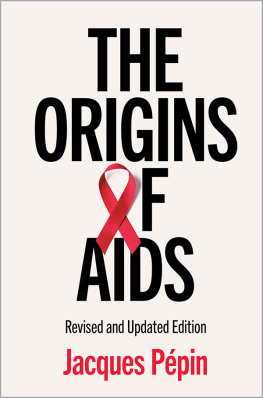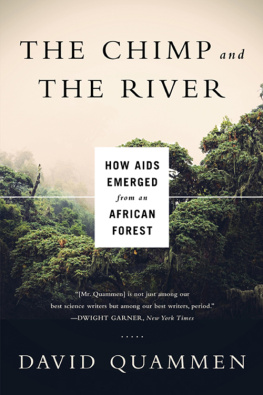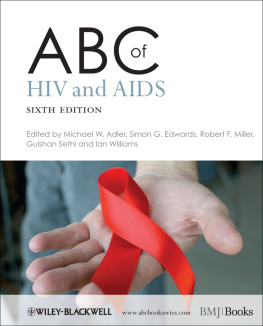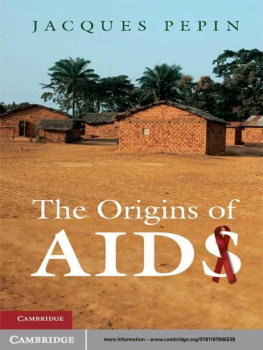
Nevirapine and the Quest to End Pediatric AIDS
REBECCA J. ANDERSON

McFarland & Company, Inc., Publishers
Jefferson, North Carolina
LIBRARY OF CONGRESS CATALOGUING DATA ARE AVAILABLE
BRITISH LIBRARY CATALOGUING DATA ARE AVAILABLE
e-ISBN: 978-1-4766-1384-0
2014 Rebecca J. Anderson. All rights reserved
No part of this book may be reproduced or transmitted in any form or by any means, electronic or mechanical, including photocopying or recording, or by any information storage and retrieval system, without permission in writing from the publisher.
On the cover: Child and physicians in the Call to Action program (photographer, Mia Collis, for Elizabeth Glaser Pediatric AIDS Foundation)
McFarland & Company, Inc., Publishers
Box 611, Jefferson, North Carolina 28640
www.mcfarlandpub.com
For the children who are still waiting.
Acknowledgments
I have many people to thank for helping me write this book. At the top of that list are Peter Farina and Susan Aiello, who have encouraged my efforts throughout. Peter has been an unfailing champion. At Boehringer Ingelheim, he was closely associated with nevirapine from its initial discovery to the most recent product line extensions, and he assured me that this was a book worth writing. He provided a wealth of institutional knowledge, connecting me to the right people, steering me to the most important literature citations, and reminding me of key events when my own knowledge was insufficient, misguided, or lacking. In an ongoing series of discussions, from my first fragmentary concept to the books final printed page, he has been an invaluable sounding board.
Likewise, Susan has been a longstanding champion of my writing and her knowledge of the publishing industry guided me as I navigated the very challenging process of attracting a publisher. Her early editorial critiques and suggestions strengthened my writing and helped me focus my efforts, which turned a mediocre early draft into a much better manuscript. Writers need encouragement to sustain and reassure them through months of frustration and the years of hard work that it takes to produce a book. I am indeed fortunate that Peter and Susan were solidly in my corner throughout this arduous process. I simply cannot thank them enough.
From the beginning, I wanted to relate this narrative through the eyes of those who did the work and those whose lives were transformed, directly or indirectly, by nevirapine. I was therefore largely dependent on obtaining the cooperation and winning the confidence of dozens of people, some of whom were former coworkers at Boehringer Ingelheim but most of whom I had never met. I am very grateful to them for generously setting aside time from their busy schedules to answer my long lists of questions and provide me with so many personal insights. They freely explained the hurdles they faced, the choices they made, and the things that inspired and frustrated them. Our conversations frequently revived clear memories of distant events long forgotten. They shared humorous anecdotes as well as details of the tragic situations they sought to overcome. And often, I found, the circumstances surrounding their extraordinary contributions were just as interesting as the contributions themselves. I am deeply indebted to each of them for sharing their personal experiences and allowing me to put them in print.
Hundreds of people were involved with developing nevirapine, AZT, and the other AIDS drugs described herein. Thousands of others at clinics, non-profit organizations, government agencies, advocacy organizations, and in the HIV/AIDS community were also involved with pediatric AIDS in significant ways. I wish I could have included all of them by name and elaborated on each of their contributions. Faced with this multitude of interesting perspectives, I inevitably had to make choices. My choices reflect a desire to highlight the people and events that defined the path of pediatric AIDS. Certainly, many others were involved in these events as well. I take responsibility for the choices I made.
I was fortunate that many contemporary authors chronicled AIDS not only in the scientific and medical literature but also in the lay press and in social, cultural, political, and economic commentaries. These print and online publications were valuable sources of firsthand information about pediatric AIDS and, as it evolved, its impact on individuals, communities, and various organizations. I especially want to thank Carol Kaliff at the Danbury News-Times, Cindy Lachlin and Richard Klein at the Food and Drug Administration, Susan Malsbury at the New York Public Library, and Charles Huber at the Davidson Library for responding to my requests for information, as well as Stewart Memorial Library, Reeves Medical Library, and the National Library of Medicine, whose archive collections I consulted repeatedly. The administrative staffs at the FDA and the National Institutes of Health were especially responsive to my requests for reports and transcripts from their archives. In addition to those publicly available sources, I am also indebted to Art Ammann, Maureen Myers, Jay Merluzzi, Bob Eckner, John Sullivan, and Brooks Jackson, who generously provided source documents from their personal files. Most importantly, I want to thank David Townson for his creative investigative work, which helped me track down some of the most elusive but essential bits of information. This book is much richer for his hard work, advice, and encouragement.
Boehringer Ingelheim kindly provided press releases and citations for abstracts, conference presentations, and publications related to nevirapine. I am especially grateful to Amy Shortlidge-Cox and Len Sierra for their literature searches and to Kate OConnor and others at Boehringer Ingelheim who responded to my many requests and assisted with fact checking key events.
Special thanks goes to the Elizabeth Glaser Pediatric AIDS Foundation for the important work they do. Elizabeth Glaser and her Foundations initiatives to address pediatric AIDS predate almost everyone else, and I am grateful to the Foundations leaders, especially Trish Karlin, Nick Hellmann, and Susan DeLaurentis, for sharing their collective institutional knowledge with me. I also want to thank Jane Coaston, Taylor Moore, Haley Donovan, John Sheeran, Bob Yule, and Evan Von Leer, who were helpful in so many ways: arranging interviews, providing archived documents and photos, fact checking, and always cheerfully responding to my questions and requests.
To balance my natural temptation, as a scientist, to emphasize the scientific and technical aspects, I am grateful to those who helped me understand the social, political, and human impact of AIDS on individuals and whole communities. My conversations with David Selberg (Pacific Pride), Doug Nelson (AIDS Resource Center of Wisconsin), and Mark Harrington (Treatment Action Group), in particular, gave me invaluable insights regarding the issues facing the HIV/AIDS community in the 1980s and 1990s. Likewise, Kimberly Lanegran and Justice Edwin Cameron patiently explained the nuances of the political ideology prevailing in South Africa in the 1990s and 2000s and provided their personal insights of the factors at play during those troubling times.
Mike Benge, Lori Hahn, Peter Jaynes, Doug Nelson, and Arlene Townson graciously took the time to read the early drafts of the manuscript, and I am extremely grateful for their efforts. Each of them reviewed the text from a different perspective, and their comments, critiques, and suggestions have helped to make the manuscript much stronger than it otherwise would have been. However, as is customary, despite all the proofing, fact checking, and editing by all of those who have reviewed this manuscript along the way, any remaining flaws are my own.
Next page
